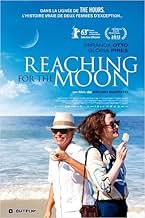IMDb-BEWERTUNG
7,0/10
3705
IHRE BEWERTUNG
Eine Chronik der tragischen Liebesbeziehung zwischen der amerikanischen Dichterin Elizabeth Bishop und der brasilianischen Architektin Lota de Macedo Soares.Eine Chronik der tragischen Liebesbeziehung zwischen der amerikanischen Dichterin Elizabeth Bishop und der brasilianischen Architektin Lota de Macedo Soares.Eine Chronik der tragischen Liebesbeziehung zwischen der amerikanischen Dichterin Elizabeth Bishop und der brasilianischen Architektin Lota de Macedo Soares.
- Auszeichnungen
- 9 Gewinne & 21 Nominierungen insgesamt
Empfohlene Bewertungen
After the famous poet, Elizabeth Bishop, is greatly mentored by the star poet Robert Lowell, she, travels to Brazil, on her inheritance, has a love affair with a wealthy, female architect, who is in another love relationship with a former fellow student of Bishop's at Vassar College, called Mary. This threesome love relationship fails because each person involved in this relationship has a main flaw. Bishop's flaw is alcoholism. The architect's flaw is that she works herself to the point of mental insanity. Mary's flaw is jealousy. She does not want to share her architect girlfriend with Elizabeth Bishop, understandably.
When watching the film in the cinema, yesterday, with the oranges and the red wine, I bought at the booth, all of us clapped at the end of the film, with wonderful actors, very beautiful scenery of Brazil as well as fantastic architecture, before tortillas, guacamole, nachos, corona and other Latin American snacks that were cheaply sold outside.
This positive account begs the question, why I did not rate that film to be so good. Like many art-house or like many artsy films, Reaching for the Moon, we hardly know who most of the characters in this film truly are. There is just not enough character development in the film. We do not know what exactly makes Miss Bishop travel, why she loves this architect, why the architect loves her and why Mary loves this architect. We also do not know their views about belonging to a sexual minority. We do not know the reason for their flaws, such as the traumatic experiences that made Miss Bishop an alcoholic, what made the architect a workaholic, who does not talk to her family, and we know almost nothing about this third girl Mary, except that she went to University with Miss Bishop.
We do not know the exact cause or even the nature of the architect's insanity. When she kills herself, she leaves no note, and nobody even asks or tries to find out why the hell she did it or if it was an accident.
Like most films about poetry little attention is paid to the kind of Poetry Miss Bishop wrote, so that when she wins the National Book Award and the Pulitzer Prize, in the film, you still end up leaving the movie theatre wondering why her poetry was considered to be so special, apart from the fact that she was rich, well educated and knew some of the greatest poets like Robert Lowell and Marian Moore.
This film is full of paper Mache' characters, in which you hardly know who the people in the film are, despite the strong attempts of the actors in the film to act as well as possible, which made the film worth watching, especially as a poet and author myself, amongst other things.
When watching the film in the cinema, yesterday, with the oranges and the red wine, I bought at the booth, all of us clapped at the end of the film, with wonderful actors, very beautiful scenery of Brazil as well as fantastic architecture, before tortillas, guacamole, nachos, corona and other Latin American snacks that were cheaply sold outside.
This positive account begs the question, why I did not rate that film to be so good. Like many art-house or like many artsy films, Reaching for the Moon, we hardly know who most of the characters in this film truly are. There is just not enough character development in the film. We do not know what exactly makes Miss Bishop travel, why she loves this architect, why the architect loves her and why Mary loves this architect. We also do not know their views about belonging to a sexual minority. We do not know the reason for their flaws, such as the traumatic experiences that made Miss Bishop an alcoholic, what made the architect a workaholic, who does not talk to her family, and we know almost nothing about this third girl Mary, except that she went to University with Miss Bishop.
We do not know the exact cause or even the nature of the architect's insanity. When she kills herself, she leaves no note, and nobody even asks or tries to find out why the hell she did it or if it was an accident.
Like most films about poetry little attention is paid to the kind of Poetry Miss Bishop wrote, so that when she wins the National Book Award and the Pulitzer Prize, in the film, you still end up leaving the movie theatre wondering why her poetry was considered to be so special, apart from the fact that she was rich, well educated and knew some of the greatest poets like Robert Lowell and Marian Moore.
This film is full of paper Mache' characters, in which you hardly know who the people in the film are, despite the strong attempts of the actors in the film to act as well as possible, which made the film worth watching, especially as a poet and author myself, amongst other things.
I enjoyed this story of a lengthy midlife love affair, "based on" (that is, "not cemented to the known facts of") real women of some mid-century renown. One, American poet Elizabeth Bishop, is quiet, slow to warm to strangers or share working drafts of her poems. See if Miranda Otto doesn't remind you of Deborah Kerr in her memorable 1940s and '50s roles (and clothes). In Brazil to visit an old college friend, Elizabeth meets Lota de Macedo Soares, a charismatic commander of attention and glamorously trousered architect. They become lovers and make their life in Brazil. All the characters, including a close male friend of Lota's and one of Elizabeth's, are revelations in the best sense: mature but unfinished adults, they meet their circumstances over nearly 20 years in ways not even they might be able to predict. Mark Twain said that fiction is obliged to meet our expectations but the truth isn't. Central Casting can provide "types," but history offers people like nobody else, which is why you'll find discussions here and elsewhere complaining that these lesbians were not put through their proper lesbian plot paces! The drunks were sometimes sober! People got depressed without enough foreshadowing! Ignore all that. This is a good quiet story, mostly but not all sad, about people learning themselves as they go, living genuinely if not always bravely.
And anyone who's ever dreamed of having a writer's sanctuary will fall rapturously in love with the al fresco study Lota builds for Elizabeth. Must be seen to be appreciated!
And anyone who's ever dreamed of having a writer's sanctuary will fall rapturously in love with the al fresco study Lota builds for Elizabeth. Must be seen to be appreciated!
Reaching for the Moon (2013)
Wonderful! The story of the Brazilian years of the great North American poet, Elizabeth Bishop. There are so many beautiful aspects to the characters, their setting, and their relationships it's hard to know where to begin. And even better, on top of all this, is the historical recreation of the times, and the changing political climate of Brazil. It's touching and uplifting and tragic.
The original title of this is "Flores Raras" because these were indeed rare people, and doing beautiful things. And yes, they were reaching for the moon but you might rather say they reached the moon. Succeeding at something is more than literally fulfilling.
The plot has a slightly meandering, unfamiliar arc through the main events, and there are times when you think one thing and then suddenly another happens. Don't blame bad writing, but rather realize that this is how life is, and how it really was. Remember as well that these are artists of privilege at work, they have money and education and act with a kind of license and liberation that we all should feel. And so it's unpredictable.
As a kind of true insight into the poetic process you might find few parallels in the movies. You learn their temperaments, and how circumstances make the artist and the poet come to their best. The intimate circumstances are about love, a really true deep love that grows between these two women. Their professional needs reinforce and conflict with their personal needs, but they make it work.
The outside circumstances are hard to understand from 2014. Brazil was once a very different country, filled with far more freedom and sense of liberation. (This seems to be a direction that are pointed in again, though going through fits and starts.) But the world in post-War Brazil was one of possibility. It was a haven (not just for ex-Nazis) and a growing "New World," but it was also stuffed with poverty (which the movie ignores), a legacy still at hand.
And this is exciting stuff. The movie moves mostly through the confines of their big, gorgeous estate in the hills, but it also shows us the city, and the larger world. So Bishop and Lota de Macedo Soares, an important architect of the era. grow and suffer and see their world fall apart around them (Brazil fell under dictatorship in the mid 1960s). It's filmed with utter beauty, the acting is sharp and convincing, and the writing (not surprisingly) is fluid and tight. Great stuff.
Wonderful! The story of the Brazilian years of the great North American poet, Elizabeth Bishop. There are so many beautiful aspects to the characters, their setting, and their relationships it's hard to know where to begin. And even better, on top of all this, is the historical recreation of the times, and the changing political climate of Brazil. It's touching and uplifting and tragic.
The original title of this is "Flores Raras" because these were indeed rare people, and doing beautiful things. And yes, they were reaching for the moon but you might rather say they reached the moon. Succeeding at something is more than literally fulfilling.
The plot has a slightly meandering, unfamiliar arc through the main events, and there are times when you think one thing and then suddenly another happens. Don't blame bad writing, but rather realize that this is how life is, and how it really was. Remember as well that these are artists of privilege at work, they have money and education and act with a kind of license and liberation that we all should feel. And so it's unpredictable.
As a kind of true insight into the poetic process you might find few parallels in the movies. You learn their temperaments, and how circumstances make the artist and the poet come to their best. The intimate circumstances are about love, a really true deep love that grows between these two women. Their professional needs reinforce and conflict with their personal needs, but they make it work.
The outside circumstances are hard to understand from 2014. Brazil was once a very different country, filled with far more freedom and sense of liberation. (This seems to be a direction that are pointed in again, though going through fits and starts.) But the world in post-War Brazil was one of possibility. It was a haven (not just for ex-Nazis) and a growing "New World," but it was also stuffed with poverty (which the movie ignores), a legacy still at hand.
And this is exciting stuff. The movie moves mostly through the confines of their big, gorgeous estate in the hills, but it also shows us the city, and the larger world. So Bishop and Lota de Macedo Soares, an important architect of the era. grow and suffer and see their world fall apart around them (Brazil fell under dictatorship in the mid 1960s). It's filmed with utter beauty, the acting is sharp and convincing, and the writing (not surprisingly) is fluid and tight. Great stuff.
Glória Pires, as Lota de Macedo Soares, dominates this film to such a degree, we wonder why it's focus is the poet Elizabeth Bishop, brittlely acted by Miranda Otto. I suppose you could argue, "That's how it was both in life and their relationship," but as a viewer, our interest begs to know more about Soares.
This is a beautiful film about very talented, privileged people. An icey, supposedly repressed Bishop finds herself in the hot house of the Brazilian estate of Soares. Their torrid relationship is the subject of the film. We forget how dangerous same sex relationships were at the time, and film doesn't try to recreate that peril. And that makes some of the dynamics that plague the relationship a question. Why is Bishop able to sail above disastrous break-up; why is Soares destroyed.
What is fascinating is the liberation that the Soares estate, Petrópolis, provides. It's an Eden-like setting where the relationship flourishes. But we want more than "extraordinary people" have the same challenges in relationships as we, the ordinary. When Pulitzer Prises or major architectural commissions are awarded, the changes in dymanics that it brings aren't really explored. And I think these extraordinaryly talented people deserve a deeper, perhaps darker, film given the times they lived in and pressures it brought.
This is a beautiful film about very talented, privileged people. An icey, supposedly repressed Bishop finds herself in the hot house of the Brazilian estate of Soares. Their torrid relationship is the subject of the film. We forget how dangerous same sex relationships were at the time, and film doesn't try to recreate that peril. And that makes some of the dynamics that plague the relationship a question. Why is Bishop able to sail above disastrous break-up; why is Soares destroyed.
What is fascinating is the liberation that the Soares estate, Petrópolis, provides. It's an Eden-like setting where the relationship flourishes. But we want more than "extraordinary people" have the same challenges in relationships as we, the ordinary. When Pulitzer Prises or major architectural commissions are awarded, the changes in dymanics that it brings aren't really explored. And I think these extraordinaryly talented people deserve a deeper, perhaps darker, film given the times they lived in and pressures it brought.
Overall had a very good impression of the movie. I think it balanced well certain aspects... especially in the portrayal of their romance. They avoided being overly prudish and that made the romance seem more real. Without getting too kinky and losing focus. The contrast between the two characters is really interesting.
The actress Gloria Pires who portrays Lota de Macedo Soares has worked in dozens of soap operas and that sometimes comes through in her films, but not this time thankfully. She so embodies the force of nature that was Lota and this comes through the screen very well. I felt like I was seeing a member of my old Rio family... so her amazing portrayal was certainly the highlight of the film for me.
PS: Being a Macedo Soares myself (but too young to have known Lota)... there might be a bit of bias in my review.
The actress Gloria Pires who portrays Lota de Macedo Soares has worked in dozens of soap operas and that sometimes comes through in her films, but not this time thankfully. She so embodies the force of nature that was Lota and this comes through the screen very well. I felt like I was seeing a member of my old Rio family... so her amazing portrayal was certainly the highlight of the film for me.
PS: Being a Macedo Soares myself (but too young to have known Lota)... there might be a bit of bias in my review.
Wusstest du schon
- WissenswertesFour paragraphs appear between the end of the film and the beginning of the credits.
1. "Few women write major poetry. Only four stand with our best men: Emily Dickinson, Marianne Moore, Elizabeth Bishop and Sylvia Plath." - Robert Lowell
2. "I'd rather be called the 'The 16th Poet' with no reference to my sex, than one of 4 women - even if the other three are pretty good." - Elizabeth Bishop
3. Elizabeth Bishop died in 1979 in the United States. She is considered on the most important poets of the English language.
4. In 2012, UNESCO declared the city of Rio De Janeiro a World Heritage site. The Flamengo Park is one of its main attractions.
- PatzerOpening in 1951 but Bobby Vinton singing Blue Velvet was not until 1963.
- Zitate
Elizabeth Bishop: It's OK. I'm not drunk. I'm just crying in English.
- Crazy CreditsNine of the main performers (the first 10) are listed in the credits without the name of their character. Only Treat Williams is credited as his character, Robert Lowell.
- VerbindungenReferenced in Programa do Jô: Folge vom 26. August 2013 (2013)
Top-Auswahl
Melde dich zum Bewerten an und greife auf die Watchlist für personalisierte Empfehlungen zu.
- How long is Reaching for the Moon?Powered by Alexa
Details
- Erscheinungsdatum
- Herkunftsland
- Offizielle Standorte
- Sprachen
- Auch bekannt als
- Reaching for the Moon
- Drehorte
- Produktionsfirmen
- Weitere beteiligte Unternehmen bei IMDbPro anzeigen
Box Office
- Bruttoertrag in den USA und Kanada
- 45.502 $
- Eröffnungswochenende in den USA und in Kanada
- 14.573 $
- 10. Nov. 2013
- Weltweiter Bruttoertrag
- 1.534.391 $
- Laufzeit1 Stunde 58 Minuten
- Farbe
- Seitenverhältnis
- 1.85 : 1
Zu dieser Seite beitragen
Bearbeitung vorschlagen oder fehlenden Inhalt hinzufügen



























